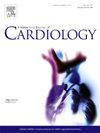Oral health behavior associated with cardiometabolic outcomes: A nationally representative cross-sectional study in Portugal
IF 3.2
2区 医学
Q2 CARDIAC & CARDIOVASCULAR SYSTEMS
引用次数: 0
Abstract
Background
Oral diseases are associated with the development of cardiometabolic diseases. This study aimed to evaluate the relationship between oral health behaviors (tooth brushing and oral health appointments) with cardiometabolic diseases.
Methods
Data from the First National Health Examination Survey were used. Participants aged 25–74 years and diagnosis of acute myocardial infarction (n = 4442), stroke (n = 4441), hypertension (n = 4450) and diabetes (n = 4327) were analyzed. A fifth subsample (n = 2555) included participants aged 40–69 for calculating cardiovascular risk. Poor oral health behavior was defined as brushing once a day or less and having the last oral health appointment at 12 months or more. Poisson regression models assessed the relationship between poor oral health behavior and these cardiometabolic outcomes.
Results
Among 4.450 participants, 20.5 % had poor oral health behavior. A statistically significant association was found between poor oral health behavior with diabetes (PR: 1.44 [95 % CI: 1.10–1.98], and high/very high cardiovascular risk (PR: 1.42 [95 % CI: 1.25–1.62]). In the sensitivity analysis the association with diabetes and high/very high cardiovascular risk persisted when considering only brushing behavior but not when considering only oral health appointments at 12 months or more.
Conclusions
Individuals with poor oral health behavior had a higher prevalence of diabetes and high/very high cardiovascular risk. Sensitivity analysis suggested that regular tooth brushing may be the main behavior for preventing diabetes and cardiovascular risk. The results suggest that regular tooth brushing may act in prevention for diabetes and cardiovascular risk.
与心脏代谢结果相关的口腔健康行为:葡萄牙一项具有全国代表性的横断面研究。
背景:口腔疾病与心脏代谢疾病的发生有关。本研究旨在评估口腔健康行为(刷牙和口腔保健预约)与心脏代谢疾病之间的关系:方法:采用第一次全国健康体检调查的数据。分析对象年龄在 25-74 岁之间,诊断为急性心肌梗死(n = 4442)、中风(n = 4441)、高血压(n = 4450)和糖尿病(n = 4327)。第五个子样本(n = 2555)包括 40-69 岁的参与者,用于计算心血管风险。不良口腔健康行为被定义为每天刷牙一次或更少,以及最后一次口腔健康就诊时间为 12 个月或更长时间。泊松回归模型评估了不良口腔健康行为与这些心血管代谢结果之间的关系:在 4 450 名参与者中,20.5% 的人有不良口腔健康行为。不良口腔健康行为与糖尿病(PR:1.44 [95 % CI:1.10-1.98])和高/极高心血管风险(PR:1.42 [95 % CI:1.25-1.62])之间存在统计学意义上的重大关联。在敏感性分析中,如果只考虑刷牙行为,而不考虑 12 个月或更长时间的口腔健康预约,则糖尿病和高/极高心血管风险的相关性仍然存在:结论:口腔健康行为不良者患糖尿病和心血管疾病高风险/极高风险的比例较高。敏感性分析表明,定期刷牙可能是预防糖尿病和心血管风险的主要行为。结果表明,定期刷牙可起到预防糖尿病和心血管风险的作用。
本文章由计算机程序翻译,如有差异,请以英文原文为准。
求助全文
约1分钟内获得全文
求助全文
来源期刊

International journal of cardiology
医学-心血管系统
CiteScore
6.80
自引率
5.70%
发文量
758
审稿时长
44 days
期刊介绍:
The International Journal of Cardiology is devoted to cardiology in the broadest sense. Both basic research and clinical papers can be submitted. The journal serves the interest of both practicing clinicians and researchers.
In addition to original papers, we are launching a range of new manuscript types, including Consensus and Position Papers, Systematic Reviews, Meta-analyses, and Short communications. Case reports are no longer acceptable. Controversial techniques, issues on health policy and social medicine are discussed and serve as useful tools for encouraging debate.
 求助内容:
求助内容: 应助结果提醒方式:
应助结果提醒方式:


